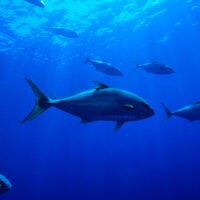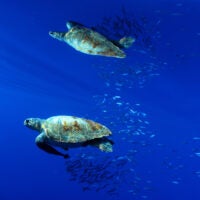Protecting 30% of the Ocean
The target to protect 30% of the world's marine habitats by 2030 can only be reached if sustainable fishing practices are put in place and Marine Protected Areas are truly protected and properly managed.
SHARE TO SHOW YOUR SUPPORT:
Habitat Protection
Since 2005, Oceana has carried out 31 at-sea research expeditions in the Atlantic, the Baltic, and Mediterranean seas to collect data and prepare formal protection proposals, including measures to ensure the recovery of degraded ecosystems, the preservation of endangered marine biodiversity, and the establishment and management of new Marine Protected Areas (MPAs).
According to the International Union for Conservation of Nature (IUCN), a Marine Protected Area (MPA) is “a clearly defined geographical space, recognized, dedicated and managed, through legal or other effective means, to achieve the long-term conservation of nature with associated ecosystem services and cultural values.”
In many cases, however, European MPAs lack effective management, and remain mere ‘paper parks’ that provide little to no actual protection at sea. For example, an Oceana analysis of European MPAs revealed that nearly three-quarters of sites were affected by one or more threats, including maritime traffic and fishing; and those not affected represented only 0.07% of the total ‘protected’ area.
Oceana is campaigning to widen the protection of Europe’s waters through the designation of new MPAs, including no-take zones, and other Fisheries Restricted Areas. We work to improve the enforcement of current regulations and to manage fisheries sustainably in these areas, by using data from our at-sea research to build the case for strengthening marine protection in all European MPAs and other vulnerable areas that deserve protection. Oceana campaigns for an ambitious network of well-managed MPAs to help restore marine habitats and species, rebuild fish stocks, and strengthen their resilience to climate change.
Accomplishments
June, 2024
European Union Adopts Nature Restoration Law, Including New Protections for Marine Habitats
December, 2023
Spain Designates Seven New Marine Protected Areas
The Spanish government designated seven new marine protected areas (MPAs) in three Spanish marine regions. These areas, rich in biodiversity and vulnerable ecosystems, will be part of the Natura 2000 Network, which includes the natural areas of greatest ecological value in the European Union. With this designation, the total marine area protected in Spain, including Natura 2000 areas and other areas, will increase from 12% to 21%, bringing the country closer to its goal of protecting 30% of its waters by 2030. The new MPAs will help protect key ecosystems and fisheries resources and provide climate refuges for species. Oceana campaigned for these new designations and contributed the scientific data on biodiversity hotspots collected during multiple expeditions. Oceana will continue to campaign to stop destructive fishing practices inside these areas.
Reports & Factsheets
Press Releases
Blog

August 11, 2025

May 21, 2025
Reports
Around the Web
Learn More


